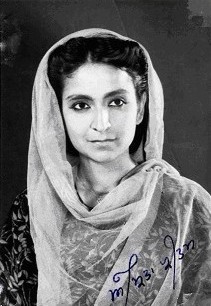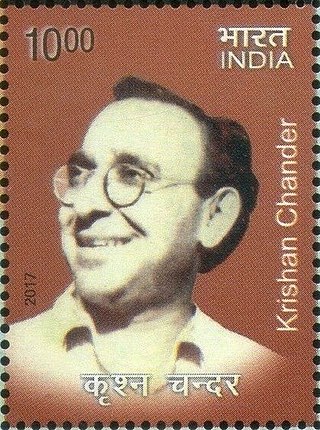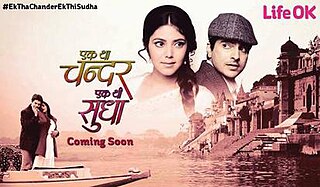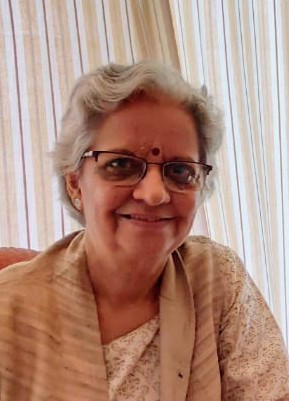Related Research Articles

Sachchidananda Hirananda Vatsyayan, popularly known by his pen name Agyeya, was an Indian writer, poet, novelist, literary critic, journalist, translator and revolutionary in Hindi language. He pioneered modern trends in Hindi poetry, as well as in fiction, criticism and journalism. He is regarded as the pioneer of the Prayogavaad (experimentalism) movement in modern Hindi literature.

Amrita Pritam was an Indian novelist, essayist and poet, who wrote in Punjabi and Hindi. A prominent figure in Punjabi literature, she is the recipient of the 1956 Sahitya Akademi Award. Her body of work comprised over 100 books of poetry, fiction, biographies, essays, a collection of Punjabi folk songs and an autobiography that were all translated into several Indian and foreign languages.

Vinod Khanna was an Indian actor, film producer and politician who is best known for his work in Hindi films; while also being a notable spiritual seeker. In Bollywood, he was the recipient of two Filmfare awards. Khanna was one of the highest-paid stars of his times, along with Amitabh Bachchan and Rajesh Khanna. He was the only superstar who could compete with Amitabh Bachchan's box office run in late 1970s to early 1980s before taking break from films. Khanna was considered the style icon & fashion icon, often referred as 'Sexy Sanyasi' in media. After joining politics, he became the MP from the Gurdaspur constituency between 1998–2009 and 2014–2017. In July 2002, Khanna became the minister for Culture and Tourism in the Atal Bihari Vajpayee cabinet. Six months later, he became the Minister of State for External Affairs.

Krishan Chander was an Indian Urdu and Hindi writer of short stories and novels. Some of his works have also been translated into English. He was a prolific writer, penning over 20 novels, 30 collections of short stories and scores of radio plays in Urdu, and later, after partition in 1947, took to writing in Hindi as well. He also wrote screen-plays for Bollywood movies to supplement his meagre income as an author of satirical stories. Krishan Chander's novels have been translated into over 16 Indian languages and some foreign languages, including English.

Dharamvir Bharati was a renowned Hindi poet, author, playwright and a social thinker of India. He was the chief editor of the popular Hindi weekly magazine Dharmayug, from 1960 till 1987.
Ranjeeta "Robby" Kaur is an Indian actress. She was trained at FTII. She has appeared in around 47 films. She has portrayed a variety of characters and her films include: Laila Majnu (1976), Ankhiyon Ke Jharokhon Se (1978) and Pati Patni Aur Woh (1978). She was nominated for the Filmfare Awards three times, including two of the above films.

Gajanan Madhav Muktibodh was one of the most prominent Hindi poets, essayists, literary and political critics, and fiction writers of the 20th century.

Andha Yug is a 1953 verse play written in Hindi, by renowned novelist, poet, and playwright Dharamvir Bharati (1926–1997). Set in the last day of the Great Mahabharat war, the five-act tragedy was written in the years following the 1947 partition of India atrocities, as allegory to its destruction of human lives and ethical values. It is a metaphoric meditation on the politics of violence and aggressive selfhood and that war dehumanized individuals and society. Thus both the victor and the vanquished lose eventually.
The Sun's Seventh Horse is a 1952 Hindi meta fiction novel by Dharamvir Bharati, one of the pioneers of modern Hindi literature. The novel presents three related narratives about three women: Jamuna, Sati, and Lily. It is narrated by Manik Mulla, who is also a character in the novel, to his friends over seven afternoons, in the style of Hitopadesha or Panchatantra. The novel looks at the disappointments in love faced by these women and how they cope with their lives. The self-reflexive story is also known for its subversive take on the "Devdas" syndrome. The Sun's Seventh Horse was published after Bharati's debut novel Gunahon Ka Devta (1949), which subsequently became a classic.
Supremo is an Indian comic book character in the series The Adventures of Amitabh Bachchan, published in the 1980s. The series was based on the actor Amitabh Bachchan.
Surendra Chaturvedi (1929–1977) was a journalist and activist prominent in the post-independence Indian cultural movement of the 1960s and 1970s when India saw a gradual increase in cultural freedom, quality of life, and means of expression, such as literature, fine arts and journalism. Poetry, drama, historical plays and paintings received great impetus. The number of newspapers, magazines and radio increased, with greater acceptance of vernacular and regional media.

Rahil Azam is an Indian actor and model, who has appeared as Hatim in Hatim, as Nakul in CID, as JD in Tu Aashiqui, as DSP Anubhav Singh in Maddam Sir, and as Rahul/Ajinkya in Achanak 37 Saal Baad.

Neelakshi Singh is an Indian Novelist and short-story writer in Hindi language. She won Sahitya Akademi Golden Jubilee Young Writers Award, Kalinga Book of the year award 2021 & Valley of Words Award 2022.
Hogaya Dimaagh Ka Dahi is a 2015 Hindi-language comedy drama film directed by Fauzia Arshi and produced by Santosh Bhartiya and Fauzia Arshi for Daily Multimedia Limited. The film stars Kader Khan, Om Puri, Raajpal Yadav, Sanjay Mishra, Razak Khan, Vijay Patkar, Amita Nangia, Chitrashi Rawat, Bunty Chopra, Subhash Yadav, Danish Bhat and Amit J. It marked the last film appearance of Kader Khan

Ek Tha Chandar Ek Thi Sudha is an Indian television series, which premiered on 21 September 2015 and is broadcast on Life OK. The series is produced by Ashwni Dhir's Garima Productions and aired every Monday to Friday night. The series is a tragic love story and is a 20-episode series based on Dharamvir Bharati’s iconic 1949 novel, Gunahon Ka Devta. Rahil Azam and Umang Jain appeared in lead roles.
Gunahon Ka Devta may refer to:

Yashwant Vyas is an Indian author, journalist, translator and editor. He is Group editorial adviser with Amar Ujala newspaper group and founder of Antara Infomedia. He headed an Indian multilingual portal group in the 1990s and has worked for three national newspapers. He has written more than ten books and scripts.

Sudha Arora is an Indian author who writes in Hindi. She has published over 100 short stories, novels, and plays. Her works have been widely translated into various Indian and foreign languages. Some of them have also been adapted for television and stage. Her first story was published in September, 1965. She is a recipient of numerous local awards for her stories as well as for her contributions to Indian feminist literature in Hindi.
Pushpa Bharati is an Indian writer and author known for her contributions to Hindi literature. She has authored 17 books in Hindi Language.
References
- ↑ Peter Gaeffke (1978). A history of Indian literature: Modern Indo-Arayan literatures, part I. Otto Harrassowitz Verlag. p. 62. ISBN 3-447-01614-0.
- ↑ Gunahon Ka Devta p. 4.
- ↑ "FIFA World Cup: Abhishek and Amitabh Bachchan are all smiles at the ground - Amitabh Bachchan: Rare pictures of the megastar". The Times of India. 29 August 2018. Retrieved 2022-09-03.
- ↑ "Life OK to adapt Dharamvir Bharat's 'Gunahon Ka Devta' novel into show". Indian Television Dot Com. 2015-08-31. Retrieved 2019-08-18.
- ↑ "Always wanted to adapt 'Gunahon Ka Devta': Ashwini Dhir". The Indian Express. 2015-09-16. Retrieved 2019-08-18.
- ↑ "A story that redefined love for an entire generation - Times of India". The Times of India. 2 September 2015. Retrieved 2019-08-18.